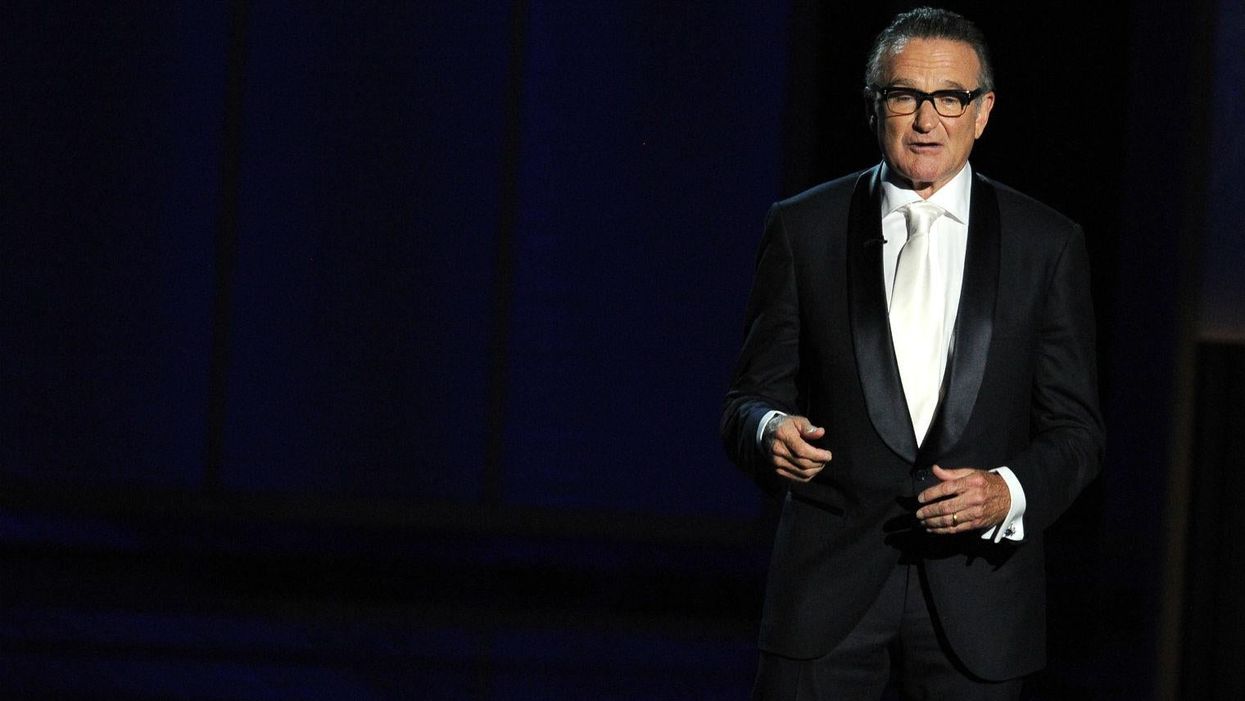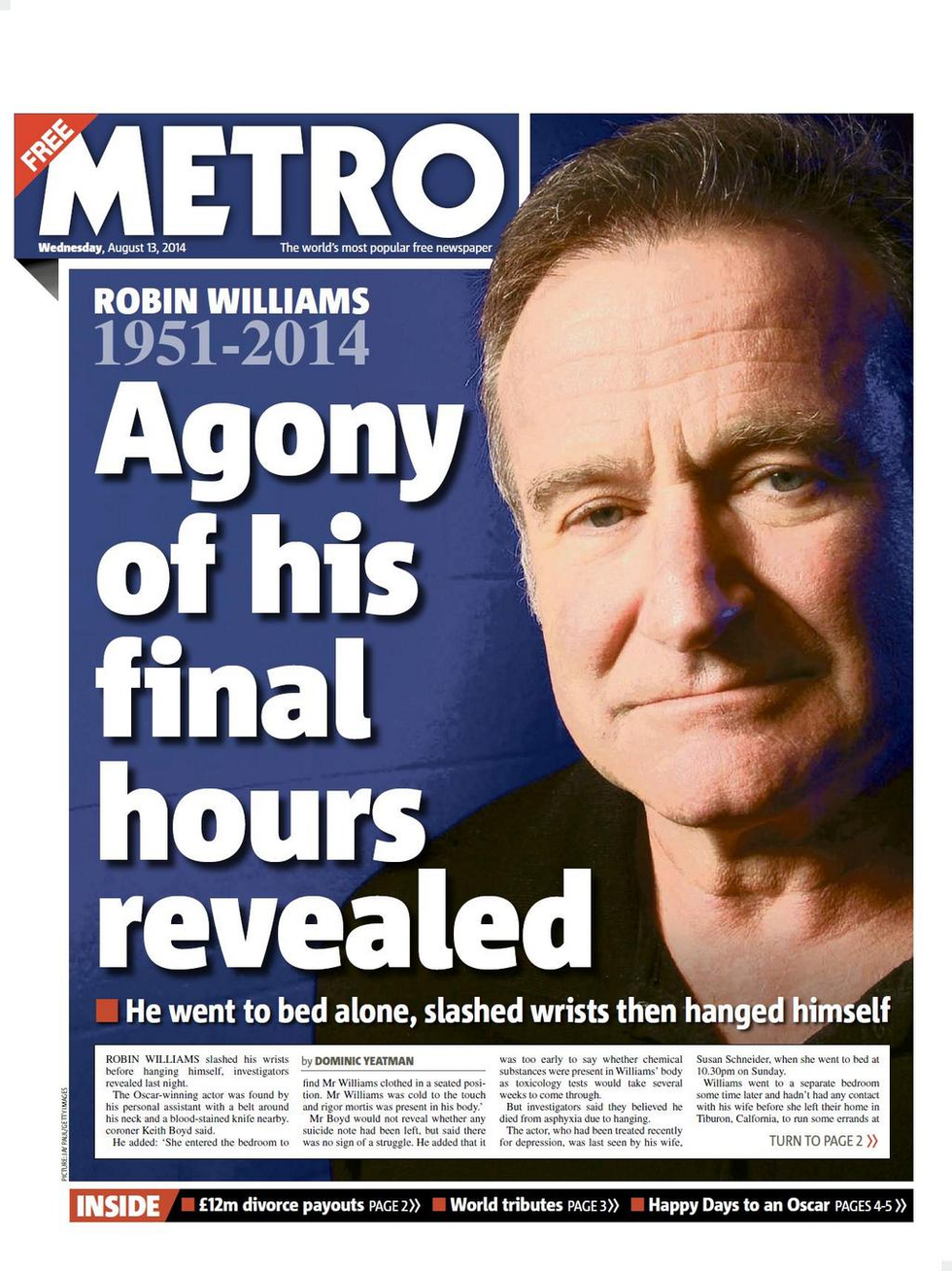News
Matthew Champion
Aug 13, 2014

Do not read further if you don't want to see newspaper front pages on the suicide of Robin Williams.
On Monday Robin Williams died aged 63, with the local coroner's office confirming it was a suicide.
The much-loved comic's death lead to an outpouring of grief online, with people sharing their favourite stories, pictures, quotes and jokes by the comedian on social media.
The news of his death arrived too late for most editions of Tuesday's newspapers in Britain, but on Wednesday he was front page news.
Some people are very upset with what they see as irresponsible reporting by the UK press.
Yesterday Samaritans put out a reminder about its guidelines for the reporting of suicide:
Be mindful that celebrity suicides have a higher risk of encouraging copycat behaviour, particularly if the media coverage is extensive and sensationalist.
Avoid explicit details of the suicide method e.g. do not state how the individual took their own life or what material was used.
Do not portray a suicide as quick, effective, painless or easy.
Where possible sensitively focus on the life achievements of the person and the wastefulness of their death. Try to refer to the wider issues associated with suicide, such as risk factors like alcohol misuse or mental health problems.
The Samaritans guidelines are just that, they aren't legal requirements, but journalists have long been aware of the fact that the reporting on suicides has the potential to do great harm.
In 2008 the World Health Organisation noted: "Vulnerable individuals may be influenced to engage in imitative behaviours by reports of suicide, particularly if the coverage is extensive, prominent, sensationalist and/or explicitly describes the method of suicide."
And as blogger Mary Hamilton points out, a review of almost 100 studies worldwide found a consistent association between media reporting and an increased risk of suicide.
The reviews authors concluded: "Irresponsible presentations of suicide in news and information media can influence copycat acts. The findings of the current review should not be interpreted as a call for censorship of the media; it is acknowledged that the media has a role to play in raising awareness of suicide as a public health issue. Rather, the findings should be interpreted as an indication that media presentation of suicide should be done responsibly, and balanced against the public’s ‘right to know’."
With all that in mind, many will find it distressing that both the Sun and Metro splashed on details of how Robin Williams committed suicide:
The Daily Mirror and the Daily Mail meanwhile tried to explain the reasons behind his suicide:
Let's just take a quick look at those guidelines again:
- Avoid explicit details of the suicide method e.g. do not state how the individual took their own life or what material was used.
- Where possible sensitively focus on the life achievements of the person and the wastefulness of their death. Try to refer to the wider issues associated with suicide, such as risk factors like alcohol misuse or mental health problems.
In a statement released to i100 following this morning's papers, director of communications Sophie Borromeo said: "The media has come a long way over the past few years in terms of sensitively reporting suicide, which is why we are concerned to see that there have been a large number of articles detailing unnecessary information about the nature of Robin Williams’ death.
"We are taking steps to address our concerns."
Yesterday, before the papers went to print, its chief executive Catherine Johnstone had said:
There is no simple explanation for why someone chooses to die by suicide and it is rarely due to one particular factor. Mental health problems are often a risk factor, as well as feelings of desperation and helplessness.
We know that that when a person is in crisis and struggling to cope, they feel trapped in their situation with no way out, and that the future holds nothing good for them. They may not be able to see beyond their situation and truly believe that suicide is the only option for them.
The service we offer at Samaritans offers a safe space for people to be themselves and talk about their problems without fear of being judged. We'd like to remind anyone who has been affected by this news that Samaritans is here.
Samaritans is available round-the-clock on 08457 90 90 90 or email [email protected]
More: 11 things you didn't know about the amazing Robin Williams
Top 100
The Conversation (0)
















